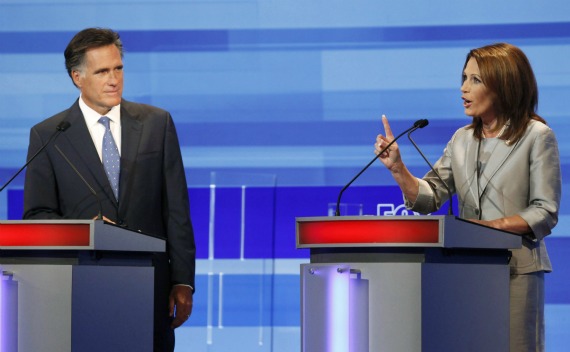How the Republican Front-Runners See Latin America
More on:

As primary election season gets underway, the Republican hopefuls have had little to say about Latin America. But there have been a few hints though from the leading candidates as to what they see when they look south – particularly with regard to Mexico.
Michele Bachmann is the most cut and dry so far. She opposes immigration and the legalization of undocumented migrants, and calls for the deployment of troops in south Texas. The Minnesota congresswoman wants to wall the border off completely, saying “As president of the United States, every mile, every yard, every foot, every inch will be covered on that southern border.” When Bachmann felt the need to strengthen her foreign policy chops last spring, she flew to Colombia and Mexico with the House Intelligence Committee – her first trip abroad to a country other than Israel (which she has visited multiple times courtesy of pro-Israel interest groups). Upon returning, she expressed strong support for the drug war.
Mitt Romney and Rick Perry have more nuanced takes – in part because they have more extensive experience in and with the region. Romney has a long history working in Latin America, as his firm Bain Capital invested extensively in Central and South America. On the campaign trail, he lauds those governments with business friendly policies, pointedly contrasting them to those with less open markets (e.g. Venezuela and Cuba).
During the 2008 electoral race Romney became increasingly tough on immigration , and even tougher on border enforcement, running ads attacking John McCain for his “soft” stances. His hardened views have caused somewhat of a family drama as many of his relatives (no, not from the Huntsman branch) live in northern Mexico and have openly criticized him, saying that “I don’t think Mitt understands the causes of illegal immigration.”
Rick Perry, the newest addition to the field and the now front-runner has little interest in Latin America, but does have a long history with Mexico. On immigration, the Texas governor is considerably more progressive than many of his peers. Perry’s record suggests that he supports the DREAM act and similar reforms, given that he approved a law allowing undocumented high school graduates in Texas to pay state tuition. He has even thrown his weight behind a guest worker program for Texas.
But Perry is increasingly vocal and tough on border security. Among the most outspoken critics of Obama’s border policy, he has repeatedly raised alarm bells about violence spilling over from Mexico into the lone star state, and asked for the deployment of military troops and predator drone in response. Unlike Bachmann, Perry has remained firmly opposed to the border fence, calling the idea “ridiculous on its face.”
This early in the season, most candidates and campaigns are focused on domestic issues. Those foreign policy issues at the forefront – Afghanistan, Libya, or Syria – aren’t necessarily a club Latin American nations would want to join. But many do bemoan the lack of interest and understanding of the rest of the Western Hemisphere by these presidential hopefuls.
Latin America should in fact matter more. The region is among the U.S. fastest growing trading partners, creating American jobs with each purchase. With over half a trillion dollars worth of goods going back and forth, Latin America is second only to Asia – and growing much faster - in terms of total trade with the United States. Its largest nations play important roles in multilateral organizations from the G20 to the United Nations Framework Convention on Climate Change (UNFCCC), helping the United States and others resolve difficult global challenges. And finally, according to the latest census 50 million Americans – 1/6 of the population – are descendants of these nations, many still with close ties to their original homes. Ignoring Latin America or alienating Latin Americans only adds up to a missed opportunity, both for the Republican Party and for the country.
More on:
 Online Store
Online Store